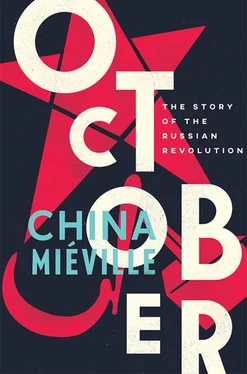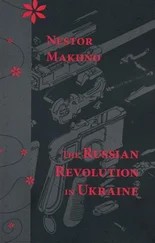China Miéville
OCTOBER
THE STORY OF THE RUSSIAN REVOLUTION
‘………………………………
………………………………’
Nikolai Chernyshevsky,
What Is to Be Done?
Midway through the First World War, as Europe shuddered and bled, an American publisher released Alexander Kornilov’s acclaimed Modern Russian History . Kornilov, a liberal Russian intellectual and politician, concluded his narrative in 1890, but for this 1917 English-language edition, his translator, Alexander Kaun, brought the story up to date. Kaun’s final paragraph opens with minatory words: ‘One need not be a prophet to foretell that the present order of things will have to disappear.’
That order disappeared, spectacularly, as those words appeared. In the course of that violent and incomparable year, Russia was rocked and wracked by not one but two insurrections, two confused, liberatory upheavals, two reconfigurings. The first, in February, dispensed breakneck with a half-millennium of autocratic rule. The second, in October, was vastly more far-reaching, contested, ultimately tragic and ultimately inspiring.
The months from February to October were a continuous jostling process, a torquing of history. What happened and the meaning of what happened remain overwhelmingly controversial. February and, above all, October have long been prisms through which the politics of freedom are viewed.
It has become a ritual of historical writing to disavow any chimerical ‘objectivity’, a disinterest to which no writer can or should want to cleave. I duly perform that caveat here: though not, I hope, dogmatic or uncritical, I am partisan. In the story that follows, I have my villains and my heroes. But, while I do not pretend to be neutral, I have striven to be fair, and I hope readers of various political hues will find value in this telling.
There are already many works on the Russian Revolution, and a good number of them are excellent. Though carefully researched – no event or spoken word described here is not recorded in the histories – this book does not attempt to be exhaustive, scholarly or specialist. It is, rather, a short introduction for those curious about an astonishing story, eager to be caught up in the revolution’s rhythms. Because here it is precisely as a story that I have tried to tell it. The year 1917 was an epic, a concatenation of adventures, hopes, betrayals, unlikely coincidences, war and intrigue; of bravery and cowardice and foolishness, farce, derring-do, tragedy; of epochal ambitions and change, of glaring lights, steel, shadows; of tracks and trains.
There is something in the Russia-ness of Russia that often seems to intoxicate. Again and again, discussions of the country’s history, particularly those of non-Russians but sometimes those of Russians themselves, veer into romanticised essentialism, evocations of some supposed irreducible, ineffable Russian Spirit, with a black box at its heart. Not only uniquely sad but uniquely inscrutable, evasive of explanation: mnogostradalnaya , much-suffering Russia; Little Mother Russia. The Russia where, as Virginia Woolf puts it in her most dreamlike book, Orlando , ‘the sunsets are longer, the dawns less sudden and sentences are often left unfinished from doubt as how to best end them’.
This cannot stand. That there are Russian specifics to the story is hardly in doubt; that they explain the revolution, let alone explain it away, is. The story must honour those specificities without losing sight of the general: the world-historic causes and ramifications of the upheaval.
The poet Osip Mandelstam, in a poem that goes by various names, a celebrated first-anniversary commemoration of the start of 1917, speaks of ‘liberty’s dim light’. The word he uses, sumerki , usually portends twilight, but it may also refer to the darkness before dawn. Does he honour, his translator Boris Dralyuk wonders, ‘liberty’s fading light, or its first faint glimmer?’
Perhaps the glow at the horizon is neither of longer sunsets nor less sudden dawns, but is rather a protracted, constitutive ambiguity. Such crepuscularity we have all known, and will all know again. Such strange light is not only Russia’s.
This was Russia’s revolution, certainly, but it belonged and belongs to others, too. It could be ours. If its sentences are still unfinished, it is up to us to finish them.
A Note on Dates
For the student of the Russian Revolution, time is literally out of joint. Until 1918, Russia used the Julian calendar, running thirteen days behind the modern Gregorian. As the story of actors immersed in their moment, this book follows the Julian, the one they used at the time. In some of the literature one might read that the Winter Palace was stormed on 5 November 1917. But those doing the storming did so on the 26th of their October, and it is their October that is a clarion, more than a mere month. Whatever the Gregorian calendar might claim, this book is written in October’s shadow.
Aman stands on a windswept island, staring up at the sky. He is powerfully built and enormously tall, and his fine clothes whip about him in the May squalls. He ignores the chop of the Neva river that surrounds him, the scrub and greenery of a sprawling littoral marshland. His rifle dangling from his hand, he gazes up in awe. Overhead, a great eagle soars.
Transfixed, Peter the Great, all-powerful ruler of Russia, watches the bird for a long time. It watches him back.
At last the man turns abruptly and plunges his bayonet into the wet earth. He forces the blade through the dirt and roots, hacking out first one, then two long strips of turf. He peels them from the ground and drags them, filthying himself, to just below where the eagle hovers. There he lays the strips down cruciform. ‘Let there be a city here!’ he bellows. Thus in 1703, on Zayachy Island in the Gulf of Finland, in land wrestled from the Swedish Empire in the Great Northern War, the tsar ordains the creation of a great city named for his own patron saint – St Petersburg.
This never happened. Peter was not there.
The story is a tenacious myth of what Dostoevsky called ‘the most abstract and premeditated city in the whole world’. But although Peter is not present on that founding day, St Petersburg goes on to be built according to his dream, against odds and sense, in a mosquito-ridden Baltic estuary floodplain, assaulted by fierce winds and punishing winters.
First the tsar directs the building of the Peter and Paul Fortress, a sprawling, star-shaped complex to fill that little island, ready for a Swedish counterattack that never comes. And then around its walls Peter orders a great port raised, in accord with the latest designs. This will be his ‘window to Europe’.
He is a visionary, of a brutal kind. He is a moderniser, contemptuous of Russia’s churchy ‘Slavic backwardness’. The ancient city of Moscow is picturesque, unplanned, a tangle of quasi-Byzantine streets: Peter directs that his new city be plotted by rational design, in straight lines and elegant curves of epic scale, its vistas wide, canals criss-crossing its avenues, its many palaces grand and palladian, its restrained baroque a determined break from traditions and onion domes. On this new ground, Peter intends to construct a new Russia.
Читать дальше














